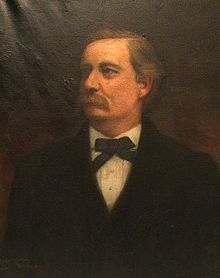John P. Buchanan
John Price Buchanan (born October 24, 1847 in Franklin , Williamson County , Tennessee , † May 14, 1930 in Murfreesboro , Rutherford County ) was an American politician and the 28th Governor of Tennessee.
Early years and political advancement
The young John Buchanan took part in the Civil War as a teenager on the Confederate side from 1864. After the war he became a farmer. In Rutherford County he built a business that specialized primarily in livestock farming. Over the years he became popular among farmers for advocating for their concerns. Finally he made it to the President of the Farmer Alliance of Tennessee, which roughly corresponds to the Tennessee Farmers' Association. The farmers had given him a seat in the Tennessee House of Representatives as early as 1887 . For the gubernatorial elections of 1890, they ensured that he received the Democratic Party nomination.
Governor of Tennessee
With the support of his farmers' association, it was not difficult for him to win the gubernatorial elections. From his tenure (1891-1893) the rural areas and the small farmers hoped for an upswing. He was already seen as a new Andrew Jackson or Andrew Johnson , both of whom had stood up for the interests of the small farmers.
Buchanan, however, was unable to meet these expectations. On the one hand, two years were simply too short to be able to reach the great role models, on the other hand he had immense domestic political problems with striking miners in the east of the country. They saw their jobs endangered by the use of convicts in the coal mines and there were great unrest and riots. The governor used the National Guard against the strikers, but got into a bind. On the one hand, the mine owners called for an end to the violence, while his friends called for an end to the lending system of convicts. His conduct in this matter cost him the support of the Democratic Party, which no longer nominated him for the 1892 elections.
In addition, the so-called Confederate Pension System was introduced during his tenure, which regulated the pension entitlements of former Confederates. Buchanan also campaigned for public support for elementary schools. Although Buchanan had done little for the farmers in his two years, they made him an independent candidate in 1892. This Independent Party was close to the Populist Party, which experienced a temporary political boom in the whole of the United States during those years, but was then unable to assert itself against the two state-supporting parties. Buchanan lost in the election to the regular Democratic candidate Peter Turney .
Old age and death
After the end of his tenure, Buchanan withdrew from politics. He returned to his farm in Murfreesboro, where he died on May 14, 1930.
He was married to Frances McGill, with whom he had eight children.
His grandson was the economist and Nobel Prize winner James M. Buchanan (1919–2013).
literature
- Robert Sobel, John Raimo (Eds.): Biographical Directory of the Governors of the United States, 1789–1978. Volume 4, Meckler Books, Westport 1978, ISBN 0-930466-00-4 .
- The National Cyclopaedia of American Biography. Vol. 7. James T. White & Company, New York.
Web links
- John Buchanan in the National Governor Association (English)
- The governors of Tennessee (English)
- John P. Buchanan in the database of Find a Grave (English)
| personal data | |
|---|---|
| SURNAME | Buchanan, John P. |
| ALTERNATIVE NAMES | Buchanan, John Price (full name) |
| BRIEF DESCRIPTION | American politician |
| DATE OF BIRTH | October 24, 1847 |
| PLACE OF BIRTH | at Franklin , Williamson County , Tennessee |
| DATE OF DEATH | May 14, 1930 |
| Place of death | Murfreesboro , Rutherford County |

